句法翻译
- 格式:ppt
- 大小:282.00 KB
- 文档页数:35
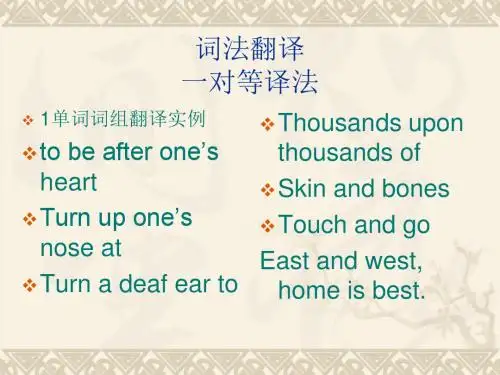
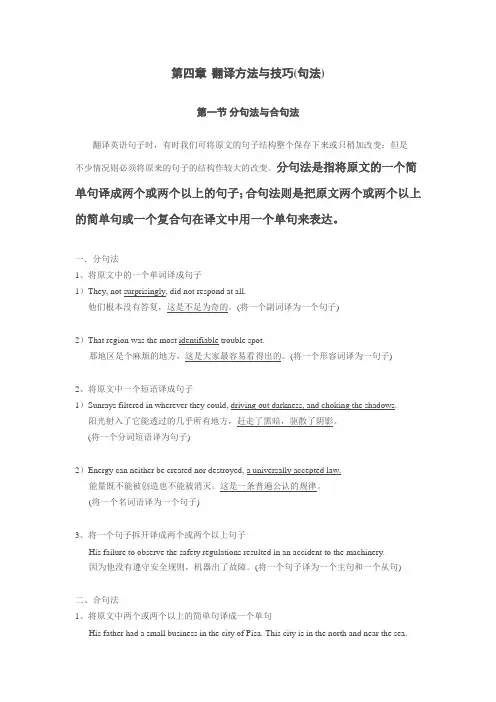
第四章翻译方法与技巧(句法)第一节分句法与合句法翻译英语句子时,有时我们可将原文的句子结构整个保存下来或只稍加改变;但是不少情况则必须将原来的句子的结构作较大的改变。
分句法是指将原文的一个简单句译成两个或两个以上的句子;合句法则是把原文两个或两个以上的简单句或一个复合句在译文中用一个单句来表达。
一.分句法1、将原文中的一个单词译成句子1)They, not surprisingly, did not respond at all.他们根本没有答复,这是不足为奇的。
(将一个副词译为一个句子)2)That region was the most identifiable trouble spot.那地区是个麻烦的地方,这是大家最容易看得出的。
(将一个形容词译为一句子)2、将原文中一个短语译成句子1)Sunrays filtered in wherever they could, driving out darkness, and choking the shadows.阳光射入了它能透过的几乎所有地方,赶走了黑暗,驱散了阴影。
(将一个分词短语译为句子)能量既不能被创造也不能被消灭。
这是一条普遍公认的规律。
(将一个名词语译为一个句子)3、将一个句子拆开译成两个或两个以上句子His failure to observe the safety regulations resulted in an accident to the machinery.因为他没有遵守安全规则,机器出了故障。
(将一个句子译为一个主句和一个从句)二、合句法1、将原文中两个或两个以上的简单句译成一个单句His father had a small business in the city of Pisa. This city is in the north and near the sea.他的父亲在意大利北部近海的比萨做小生意。
(将两个单句译为一个单句)2、将原文中的主从复合句译成一个单句When I negotiate, I get nervous. When I get nervous, I eat.我在谈判时总是有些紧张。
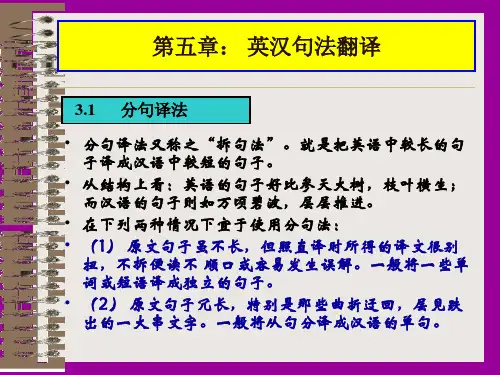
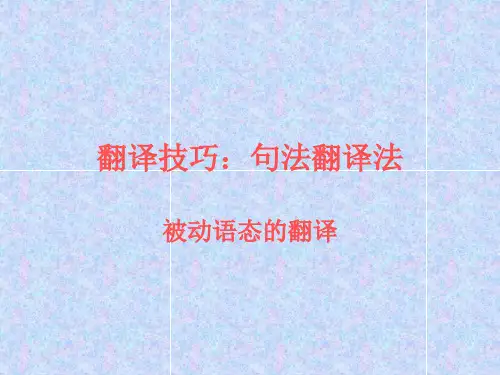
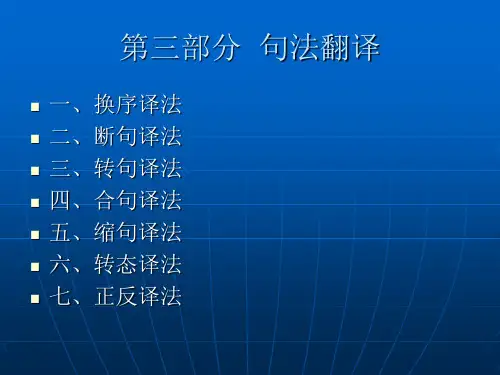
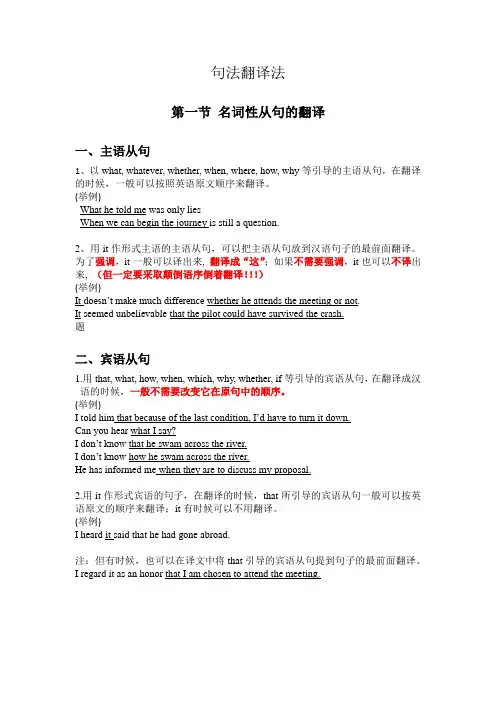
句法翻译法第一节名词性从句的翻译一、主语从句1、以what, whatever, whether, when, where, how, why等引导的主语从句,在翻译的时候,一般可以按照英语原文顺序来翻译。
(举例)What he told me was only liesWhen we can begin the journey is still a question.2、用it作形式主语的主语从句,可以把主语从句放到汉语句子的最前面翻译。
为了强调,it一般可以译出来, 翻译成“这”;如果不需要强调,it也可以不译出来, (但一定要采取颠倒语序倒着翻译!!!)(举例)It doesn’t make much difference whether he attends the meeting or not.It seemed unbelievable that the pilot could have survived the crash.题二、宾语从句1.用that, what, how, when, which, why, whether, if等引导的宾语从句,在翻译成汉语的时候,一般不需要改变它在原句中的顺序。
(举例)I told him that because of the last condition, I’d have to turn it down.Can you hear what I say?I don’t know that he swam across the river.I don’t know how he swam across the river.He has informed me when they are to discuss my proposal.2.用it作形式宾语的句子,在翻译的时候,that所引导的宾语从句一般可以按英语原文的顺序来翻译;it有时候可以不用翻译。
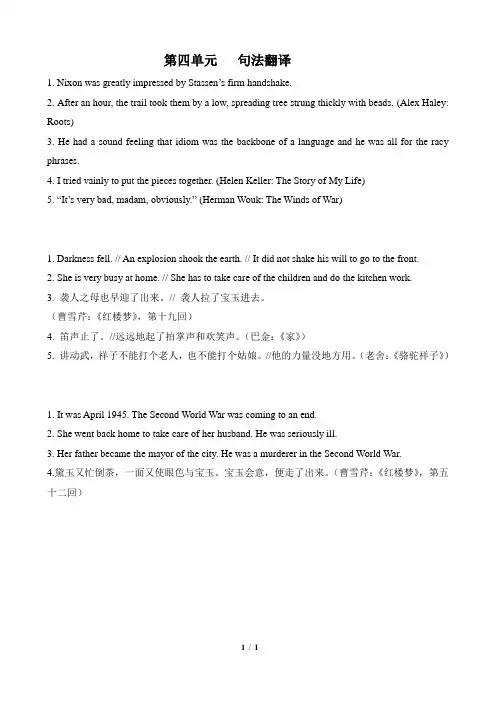
第四单元句法翻译1. Nixon was greatly impressed by Stassen’s firm handshake.2. After an hour, the trail took them by a low, spreading tree strung thickly with beads. (Alex Haley: Roots)3. He had a sound feeling that idiom was the backbone of a language and he was all for the racy phrases.4. I tried vainly to put the pieces together. (Helen Keller: The Story of My Life)5. “It’s very bad, madam, obviously.” (Herman Wouk: The Winds of War)1. Darkness fell. // An explosion shook the earth. // It did not shake his will to go to the front.2. She is very busy at home. // She has to take care of the children and do the kitchen work.3. 袭人之母也早迎了出来。
// 袭人拉了宝玉进去。
(曹雪芹:《红楼梦》,第十九回)4. 笛声止了。
//远远地起了拍掌声和欢笑声。
(巴金:《家》)5. 讲动武,祥子不能打个老人,也不能打个姑娘。
//他的力量没地方用。
(老舍:《骆驼祥子》)1. It was April 1945. The Second World War was coming to an end.2. She went back home to take care of her husband. He was seriously ill.3. Her father became the mayor of the city. He was a murderer in the Second World War.4.黛玉又忙倒茶,一面又使眼色与宝玉。
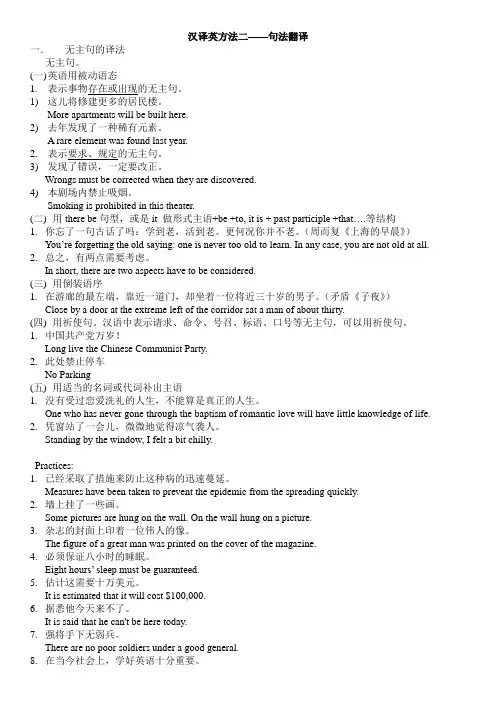
汉译英方法二——句法翻译一.无主句的译法无主句。
(一)英语用被动语态1.表示事物存在或出现的无主句。
1)这儿将修建更多的居民楼。
More apartments will be built here.2)去年发现了一种稀有元素。
A rare element was found last year.2.表示要求、规定的无主句。
3)发现了错误,一定要改正。
Wrongs must be corrected when they are discovered.4)本剧场内禁止吸烟。
Smoking is prohibited in this theater.(二)用there be句型,或是it 做形式主语+be +to, it is + past participle +that….等结构1.你忘了一句古话了吗:学到老,活到老。
更何况你并不老。
(周而复《上海的早晨》)You’re forgetting the old saying: one is never too old to learn. In any case, you are not old at all.2.总之,有两点需要考虑。
In short, there are two aspects have to be considered.(三)用倒装语序1.在游廊的最左端,靠近一道门,却坐着一位将近三十岁的男子。
(矛盾《子夜》)Close by a door at the extreme left of the corridor sat a man of about thirty.(四)用祈使句。
汉语中表示请求、命令、号召、标语、口号等无主句,可以用祈使句。
1.中国共产党万岁!Long live the Chinese Communist Party.2.此处禁止停车No Parking(五)用适当的名词或代词补出主语1.没有受过恋爱洗礼的人生,不能算是真正的人生。
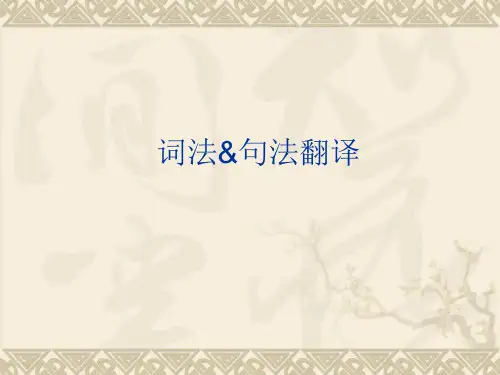
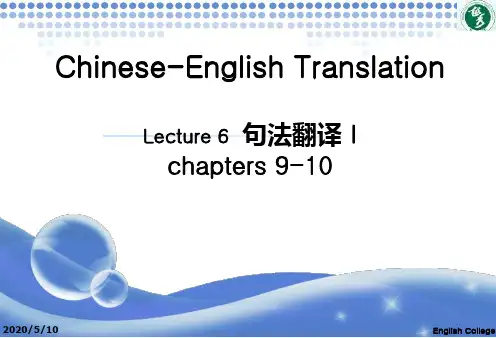
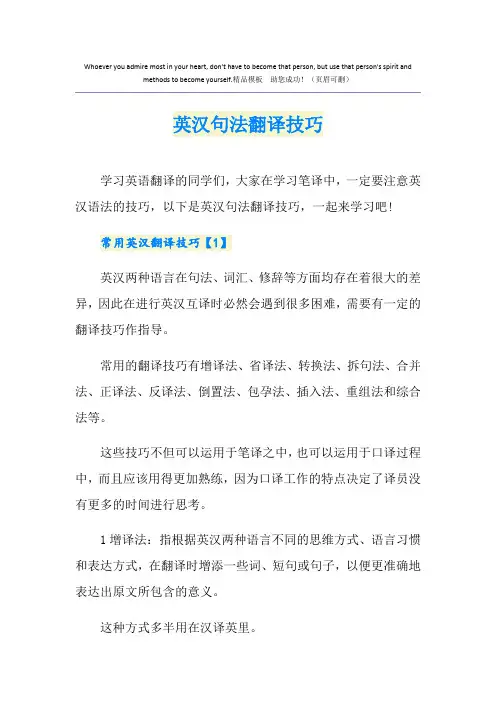
Whoever you admire most in your heart, don't have to become that person, but use that person's spirit and methods to become yourself.精品模板助您成功!(页眉可删)英汉句法翻译技巧学习英语翻译的同学们,大家在学习笔译中,一定要注意英汉语法的技巧,以下是英汉句法翻译技巧,一起来学习吧!常用英汉翻译技巧【1】英汉两种语言在句法、词汇、修辞等方面均存在着很大的差异,因此在进行英汉互译时必然会遇到很多困难,需要有一定的翻译技巧作指导。
常用的翻译技巧有增译法、省译法、转换法、拆句法、合并法、正译法、反译法、倒置法、包孕法、插入法、重组法和综合法等。
这些技巧不但可以运用于笔译之中,也可以运用于口译过程中,而且应该用得更加熟练,因为口译工作的特点决定了译员没有更多的时间进行思考。
1增译法:指根据英汉两种语言不同的思维方式、语言习惯和表达方式,在翻译时增添一些词、短句或句子,以便更准确地表达出原文所包含的意义。
这种方式多半用在汉译英里。
汉语无主句较多,而英语句子一般都要有主语,所以在翻译汉语无主句的时候,除了少数可用英语无主句、被动语态或"There be…"结构来翻译以外,一般都要根据语境补出主语,使句子完整。
英汉两种语言在名词、代词、连词、介词和冠词的使用方法上也存在很大差别。
英语中代词使用频率较高,凡说到人的器官和归某人所有的或与某人有关的事物时,必须在前面加上物主代词。
因此,在汉译英时需要增补物主代词,而在英译汉时又需要根据情况适当地删减。
英语词与词、词组与词组以及句子与句子的逻辑关系一般用连词来表示,而汉语则往往通过上下文和语序来表示这种关系。
因此,在汉译英时常常需要增补连词。
英语句子离不开介词和冠词。
另外,在汉译英时还要注意增补一些原文中暗含而没有明言的词语和一些概括性、注释性的词语,以确保译文意思的完整。
Lecture 7I.Inverted translation (换序译法)左右right and left 高矮short and tall 文艺art and literature 贫富rich and poor手疾眼快quick of eye and deft of hand 软硬hard and soft1. 他认真热情,一字不漏地记下了所说的话。
(谓语&状语进行调整)Conscientious and eager, he put down what was said, careful not to miss a word.2. 他们乐观、能干、热情,总是想方设法使你一路上顺利舒适。
Optimistic, able and hospitable/warm-hearted, they always try every possible means to make your journey smooth and comfortable.3. 从他们走上祖国土地的时刻起,他们就受到同胞们热情接待。
(从…起—定语从句)Since/from the moment they set foot on their motherland, they will warmly received by their compatriots.4. 她,一个瘦弱多病的女孩子,以她坚强的毅力写出了一部部催人奋进的小说。
A thin and weak girl susceptible/vulnerable to diseases, she wrote one aspiring novel after another with strong will.5. 我们为顾全大局在第三方的调停下开诚布公地多次强烈要求贵方赔偿我们的一切损失。
(在…下:外围结构—独立结构;为的是…:目的—不定式) with the third party acting as an intermediary, to take the interests of the whole into account, we strongly demanded with frankness and sincerity many times that you should compensate allour losses.6. 环境好,图书设备充足,有良师益友指导启发,当然有很大的帮助,但是具备了这些条件,也不一定能保证一个人在学问上就有成就。
英汉句法翻译技巧
1.词序调整:英语中的主语通常放在句子的前面,而汉语中的主语通
常放在句子的后面。
在翻译时,可以根据语言习惯对句子的词序进行适当
调整。
2.助动词的处理:英语中的助动词较多,而汉语中没有或较少使用助
动词。
在翻译时,可以省略或转换助动词,使句子更符合汉语的表达习惯。
3.时态和语态的转换:英语中强调时间和语态的变化较多,而汉语中
对这些变化的表达较为灵活。
在翻译时,可以根据语境和需要适当调整时
态和语态,以符合汉语的表达习惯。
4.从句和介词短语的转换:英语中常用从句来表达复杂的句子结构,
而汉语中则常用介词短语来表达相同的意思。
在翻译时,可以将从句转换
为介词短语,以使句子更贴近汉语的表达习惯。
5.省略和补充:在翻译时,有时需要省略原文中的一些冗余信息或重
复的内容,以使译文更简洁明了。
同时,也需要根据语境和需要添加一些
必要的信息,以完整表达原文的意思。
总之,英汉句法翻译技巧包括对词序调整、助动词处理、时态和语态
转换、从句和介词短语转换以及省略和补充等方面的灵活运用,旨在准确
表达原文的意思和句法结构,使译文更贴近汉语的表达习惯。